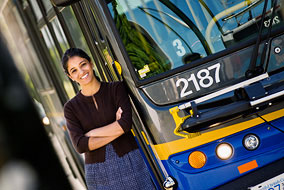
Meena Sharma will support the academic transition of first-year students through weekly small-group meetings - photo by Martin Dee UBC Reports | Vol. 54 | No. 8 | Aug. 7, 2008
A FAACT of Commuter Life: New Support for Arts Students
By Lorraine Chan
The reality for most first-year students at UBC Vancouver is the twice-daily mad dash for a bus followed by long commutes that eat up precious time and energy.
Currently, about two-thirds of first-year students live off campus. To offset these challenges, the Faculty of Arts has launched a new year-round program that will support first-year commuter students in their academic transition, while providing a way for them to plug into the rich and diverse offerings of campus life.
Next month, up to 200 first-year students will be welcomed into the Faculty of Arts Academic Commuter Transition Program (FAACT).
“We recognize that commuter students face unique challenges in adjusting to university life,” says Norma Wieland, Arts Assistant Dean, Student Services. “Compared to students who live in residence, they have more difficulty accessing resources, building relationships, and establishing connections.”
FAACT is built on the cohort model, which has proven to help students build a stronger academic community. Already deployed in Arts One and the Coordinated Arts Program, the cohort model allows students to commence their degrees within a designated group and fosters a more intimate learning environment.
“Data tells us that students really value this sense of community,” says Wieland, “and are more academically successful when they have a strong peer support network.”
FAACT will encourage students to participate in small peer communities, with groups divided into cohorts of 20.
FAACT groups will meet weekly in a scheduled seminar with two senior student leaders who are responsible for mentoring, advising and coaching the cohort. These seminars are designed to help students enhance their academic performance and sense of community.
The FAACT student leaders will coordinate and facilitate workshops, discussions, events or activities. These will explore key themes including: selecting a major; exploring career options; getting involved in scholarly leadership such as editing a student journal; learning about study abroad and undergraduate research opportunities; and discovering campus resources.
An additional level of support will come from Arts faculty members who will meet with FAACT groups on a monthly basis.
Along with the FAACT program, UBC is supporting commuter students through other measures. These include a commuter magazine that will be distributed to all first-year students before classes begin and the option to rent a room from the newly opened student hostel at one of the campus residences so they can take part in campus activities without needing late night travel.
UBC is also launching a new online events calendar in September. The UBCevents website will make it easier for students to navigate campus life and find the right opportunities for engagement at: www.events.ubc.ca.
Meena Sharma says she decided to work as a FAACT student leader because of her own transition when she started at UBC in 2006.
“Although my commute wasn’t that long since I lived in the Vancouver area,” says Sharma, “it was still really hard to get to know people and feel a sense of community.”
Prior to UBC, Sharma had bounced back and forth between York University and Langara College. Without peer or faculty networks, it was difficult to put down academic and social roots at UBC, says Sharma, a fourth-year sociology and political science student.
Life blossomed, however, when Sharma experienced the support of a small academic community. Between 2007 and 2008, she headed up the Sociology Students Association (SSA) as co-president. Through that experience, Sharma gained greater confidence and new skills along with generous faculty mentors, among them Sociology Dept. Head Neil Guppy.
Sharma also met Katherine Lyon, SSA Co-President, whom she now counts as a friend for life. “We just had this phenomenal way of working together and sharing our philosophies, which we discovered were really similar.”
Sharma says she’s eager to share with FAACT participants what she has learned through her own process of academic and personal growth.
“My message will be take the risk, don’t by shy, get involved,” says Sharma. “Do it without expectations, find something you genuinely enjoy and great things will evolve.”
To read more about the FAACT program, visit: www.arts.ubc.ca/students/faact.
|
